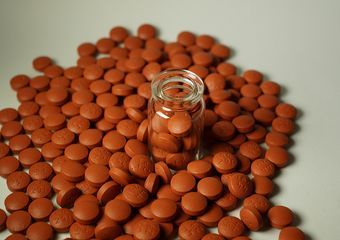Three Strategies for Dealing with Heartburn while Thru-Hiking
My 2017 PCT thru-hike didn’t quite go as planned. Due to some medical issues, I went home from Lone Pine and took about five weeks off-trail. After sorting myself out, I went back and hiked Oregon and had a much better time. During my time off, I did some medical testing to figure out what was going on with me. One of the symptoms I’d been struggling with had been recurring chest pain. It would come and go, but made it difficult for me to breathe. Frankly, it was pretty scary. My doctor prescribed puffers in case it was asthma, which helped a little. I got blood testing and a chest X-ray. Nothing seemed wrong. Then a doctor suggested to me that it could be heartburn. He suggested I take a daily antacid, and the problem more or less disappeared.
I couldn’t believe it. Heartburn had been causing me this much trouble? But it turns out that long-term heartburn is no joking matter. Chronic acid reflux (also known as gastroesophageal reflux disease or GERD) can cause complications such as esophagitis (inflammation of the esophagus), esophageal strictures (swallowing difficulty caused by narrowing or tightening of the esophagus), and Barrett’s esophagus (abnormal esophageal cells, which have a strong association with esophageal adenocarcinoma, a deadly cancer).
Risk Factors
There are many risk factors to heartburn, and some people seem to be more predisposed to it than others. Personally, I’ve suffered from heartburn since childhood, though not to the level I experienced on the PCT. Some risk factors include weight, smoking, diet, pregnancy, and taking certain medications. Here are some tips to reduce heartburn while hiking so you can get back to enjoying the wilderness.
1) We Need to Talk about Ibuprofen
Known on trail as Vitamin I, ibuprofen is one of the most common drugs that thru-hikers take. It reduces pain and inflammation, almost constant companions when putting yourself through something as physically strenuous as thru-hiking. The reduction in inflammation reduces the chance of worsening existing injuries. Anti-inflammatories also help reduce the inflammation that is caused by thru-hikers’ poor diets. What’s not to like?

image via
Ibuprofen is part of a class of drugs called NSAIDs—non-steroidal anti-inflammatory drugs. These include naproxen (Aleve), ibuprofen (Advil), ASA (aspirin), celecoxib (Celebrex), and many more. Although they are very effective at reducing inflammation, there can be serious side effects from prolonged usage.
According to a 2005 study from the American Gastroenterological Association, an estimated 103,000 people are hospitalized and 16,500 die from complications of long-term NSAID use every year. Some of these side effects include stomach pain or ulcers and intestinal damage, not helpful effects for those who experience acid reflux. I understand that it is difficult to hike long-distances without taking any painkillers, and NSAIDs are good at what they do. But try to avoid extended usage whenever possible, especially if you are already prone to heartburn.
Other Acid-Inducing Medication
There are other medications that can cause or inflame heartburn, including iron supplements, osteoporosis medication, some antibiotics (including tetracycline), and some anti-anxiety or antidepressant medications (including tricyclic antidepressants. Amitriptyline (Vanatrip, Endep), imipramine (Tofranil), nortriptyline (Pamelor, Aventy), Diazepam (Valium) or lorazepam (Ativan)). If you take one of these drugs and also suffer chronic heartburn, it may be worth discussing with your doctor if there is an alternate drug that is less hard on your gut.
Note: You should not start or stop taking a regular drug without consulting your physician.
2) Dietary Choices
Diet is also a key factor in preventing or reducing heartburn. Eating too much of the following can cause or exacerbate heartburn:
- Refined carbohydrates.
- Alcohol.
- Caffeine.
- Spicy food (Sorry, Siracha packets. I love you, but we just won’t work out.).
- Citrus fruits or drinks.
- Chocolate (from my cold, dead hands).
- Mint-flavored food or candy.
While these will prevent or reduce it:
- As many leafy green vegetables as you can manage.
- Lean meats.
- High-fiber foods such as oatmeal.
- Healthy fats such as walnuts, olive oil.
- Fresh ginger or a ginger tea.
There is no doubt that it is difficult to eat well on trail. Fresh vegetables are a delicacy. So here are some other heartburn-reducing strategies that might be easier to implement while hiking:
Reduce the amount of fat consumed per sitting.
When I visited a dietitian after returning from the trail, she didn’t suggest reducing my overall fat intake, rather the quantity of fat I eat in a single sitting. Fat digests slower than carbohydrates and protein, which can cause heartburn. Try to eat healthy fats (avoid saturated and trans fats whenever possible) and space out your fat intake throughout the day.
Avoid overeating.
Eating too much in one sitting can increase the chance of acid reflux. Besides, the calorie-drip technique is perfectly tailored for trail life, so go for frequent, small meals and try to avoid gorging yourself (I’m looking at you, Timberline Lodge All-You-Can-Eat On-Trail Buffet) (just kidding, love you Timberline).
Eat three to four hours before bed.
Eating immediately before bed means that you’ll still be digesting as you sleep. Not only does this make your sleep less restful, but can also be a trigger for heartburn. If you like to night hike, try having a break for dinner around three to four hours before bed, then keep hiking until you’re ready to crash.
3) Acid-Reducing Medication
One further option is to take a drug to reduce your heartburn. There are several ways to address this.
Immediate relief: Medications like Tums or Rolaids fight existing acid and help neutralize your stomach.
Over-the-counter drugs: A daily over-the-counter pill like ranitidine (Zantac), famotidine (Pepcid AC), and cimetidine (Tagamet) will help reduce acid production in your stomach.
Prescription antacid: A prescription for a proton pump inhibitor (PPI) such as omeprazole (Prilosec, Prilosec OTC) and esomeprazole (Nexium) will stop almost all acid production in your stomach.

image via
Which option is best for your situation depends on the severity and frequency of your heartburn. Talking to a doctor about this is probably a good bet.
So try and get a few more fresh greens in your diet. Quitting smoking is another lifestyle change that can significantly reduce heartburn. And maybe don’t take the maximum dosage of Vitamin I every day… or any if, like me, you know it doesn’t agree with your stomach.
At the end of the day, it is important to research what you are putting into your body and to be attentive to what effects they cause. I highly recommend doing your own reading on all the topics listed in this article, from the potential side effects of NSAIDs to dietary strategies. Here are a few selections that I read while writing this article. Happy hiking!
Further reading:
Ibuprofen:
- World’s Most Popular Painkiller Raises Heart Attack Risk;
- Study Shows Long-term Use Of NSAIDs Causes Severe Intestinal Damage;
- Use of Non-Steroidal Anti-Inflammatory Drugs That Elevate Cardiovascular Risk
- Safety Of non-Steroidal anti-inflammatory drugs
- Anti-inflammatory drugs: A closer look at the risks
Heartburn:
Note: I am not a medical professional. This advice has come from personal experience dealing hiking with heartburn on the PCT.
This website contains affiliate links, which means The Trek may receive a percentage of any product or service you purchase using the links in the articles or advertisements. The buyer pays the same price as they would otherwise, and your purchase helps to support The Trek's ongoing goal to serve you quality backpacking advice and information. Thanks for your support!
To learn more, please visit the About This Site page.





Comments 4
Why not the simple, tried and true?
<>
Too easy? To inexpensive?
Why not the simple, tried and true?
• Baking soda, also known as sodium bicarbonate, is a natural antacid. If you dissolve a teaspoon of baking soda into 8 ounces of water and drink it, it can neutralize stomach acid and temporarily alleviate heartburn caused by acid reflux.
Too easy? To inexpensive? You can carry a chingo of baking soda in a tiny plastic bag. Hell you can buy an entire box at Walmart for 50¢
Baking soda is great if a person has minor heartburn. Cheaper than Tums but possibly not as convenient. It doesn’t work for severe acid reflux. By the time you feel the burn, damage is already being done. Stricture and Barrets Esophagus are serious. Also, it does nothing to help when you wake in the middle of the night having aspirated stomach acid. A daily PPI for the last 20 years has greatly improved my quality of life.
I had no idea that ibuprofen could have those side effects, you learn something new everyday. Great information that I know I will remember and will hopefully help many people on the trails.